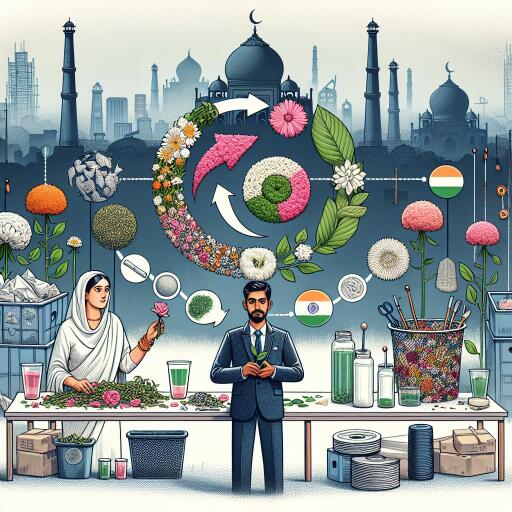Transforming Floral Waste into Wealth: Initiatives Bolstering India’s Circular Economy
In an era where sustainability has become pivotal, India is witnessing a remarkable transformation within its floral waste sector, not only creating gainful employment for women but also steering waste away from landfills and towards a greener, circular economy.
The circular economy is fundamentally about shifting from traditional, linear ways of dealing with goods – where items are made, used, and disposed of – to a more sustainable approach. This involves a cycle of sharing, leasing, reusing, refurbishing, and recycling materials and products for as long as possible, thus extending their lives.
One innovative strategy is the introduction of composting pits in temples and engaging temple trusts and self-help groups (SHGs) in recycling initiatives. These efforts offer numerous job opportunities, while education programs aimed at priests and devotees advocate for reducing floral waste by not dumping it in rivers.
The concept of “Green Temples” proposes an integration of policies to revitalize temples into eco-friendly hubs. Such initiatives may include encouraging digital offerings or using biodegradable materials instead of traditional flowers to minimize the waste generated.
Moreover, the involvement of the National Horticulture Board in overseeing the management of floral waste in public spaces like parks could significantly contribute to environmental protection efforts.
Floral waste, primarily from religious sites, often finds its way into landfills or water bodies, posing significant health and environmental risks. A UN Climate Change report highlighted that the river Ganga alone is burdened with over 8 million metric tons of floral waste annually. Innovative solutions under initiatives like Swachh Bharat Mission-Urban 2.0 have commenced, with social entrepreneurs stepping in to recycle flowers into valuable products like organic compost, soaps, candles, and incense sticks.
In Ujjain, the Mahalakaleshwar Temple sees a daily visitor count of 75,000 to 100,000, generating 5-6 tonnes of floral waste. Special vehicles collect this waste for processing into eco-friendly products. The initiative has seen the employment of sixteen women from the Shiv Arpan Self-Help Group, producing various goods from the recycled materials. Additionally, the waste is transformed into briquettes used as biofuel and compost for local farming needs.
In Mumbai, the Siddhivinayak Temple attracts 40,000 to 50,000 devotees a day, with offerings including 120 to 200kgs of flowers. A Mumbai-based designer house has embarked on a sustainable journey, transforming these discarded blooms into natural dyes for fabrics, garments, and other textiles. This process involves the collection, segregation, and transformation of floral waste into vibrant dyes.
Similarly, in Tirupati, over six tons of floral waste are collected from temples every day. This city has harnessed the potential of this waste, turning it into reusable products and employing 150 women from self-help groups through its upcycling initiatives.
Entrepreneurial ventures like Kanpur-based Phool are at the forefront of addressing the temple-waste dilemma by converting floral waste into products such as incense sticks, cones, and havan cups. Phool provides a secure and beneficial working environment for women, including fixed salaries and access to healthcare and transport.
Hyderabad’s startup, ‘HolyWaste,’ embarks on a unique ‘Florjuvination’ process, working with vendors, temples, and other floral waste generators to create eco-friendly fertilizers, incense sticks, and more. Engaging actively in this sector, Holy Waste prevents significant amounts of waste from polluting water bodies or ending in landfills.
Additionally, ‘Aaruhi,’ a startup operating in the Delhi-NCR region, showcases the potential of recycling floral waste into a profitable business, training over 3,000 women to craft products from recycled flowers and achieving significant monthly revenue.
Through these enlightened endeavors, India is not only nurturing a sustainable environment but is also promoting the circular economy model, creating a greener future for the coming generations.
